Papers by Ksenia Tenisheva
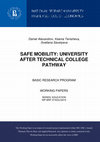
Social Science Research Network, 2015
This paper presents the professional college system as a social mobility channel providing maximu... more This paper presents the professional college system as a social mobility channel providing maximum benefit with minimum risk. The analysis of institutional features and changes forming this channel in Russia in the last 15 years has been conducted. An institutional context for the emergence of a social group using "university after the college" pathway is described. Group members take an intermediate position between students reproducing a professional worker status and students reproducing a highly qualified professional status. They also have average school results. An analysis of parents' and students' perceptions of the motives of the choice, benefits, costs, and risks of the educational pathway demonstrates the importance of local context. An alternative educational pathway is less typical for the rural population because of structural constraints; compared to metropolises, in rural areas this choice is typical for higher status groups. A comparison of technical college systems in different countries confirmed that technical colleges in Germany provide social reproduction whereas in Russia and the USA, they operate as a channel of upward social mobility.
International Journal of Emerging Technologies in Learning (ijet), Mar 14, 2019
This paper studies the patterns of learning behaviour in connection with educational achievement ... more This paper studies the patterns of learning behaviour in connection with educational achievement in multi-year undergraduate data science minor specialisation for non-STEM students. In particular, this work focuses on analysing the predictors of academic achievement in blended-learning setting factors related to initial mathematics knowledge, specific traits of educational programs, online and offline learning engagement, and connections with peers. Robust linear regression and non-parametric statistical tests reveal a significant gap in the achievement of students from different educational programs and on the connection between their class attendance and achievement. The results indicate that achievement is not related to the communication on the Q&A forum while peers do affect academic success.
Voprosy obrazovaniâ, Dec 20, 2017
Журнал социологии и социальной антропологии, 2020
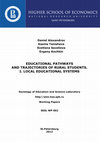
The paper presents first report on the study of rural schools and students in one educational dis... more The paper presents first report on the study of rural schools and students in one educational district of Leningrad region. The district comprises 12 small rural municipalities and 2 townships with 18 schools. The study employed both qualitative and quantitative methods and focuses on sorting between schools and educational choice after the 9 th grade when students can either stay in their schools or transfer to vocational schools and technical colleges in the urban area of St. Petersburg. In the paper the educational choices and resulting trajectories are viewed in local social context. Researchers introduce a notion of "local educational system", defined a set of local social (and geographical) opportunities and existing educational pathways which determine educational choice of parents and students. Higher education is a preferred goal after the school for the majority of students, but the trajectories to this goal are different depending on both family resources and local circumstances, including school differentiation and student flows between schools. The paper makes a case for studying educational choice by surveying all schools in the context of local educational systems rather than in surveying schools randomly taken from different local contexts.
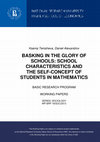
Social Science Research Network, 2013
Our study contributes to the debate on the interaction between academic context, individual achie... more Our study contributes to the debate on the interaction between academic context, individual achievement, and mathematics self-concept in schools. It is known that high-achieving peers positively influence the individual achievements of all group members. At the same time, it has been shown that the self-concept of students tends to decrease in the presence of high-achieving peers, as individuals make relative judgments of their abilities vis-à-vis their peer group. Students with mediocre performance feel more confident about their abilities in a group of poor achievers (the Big-Fish-Little-Pond Effect-BFLPEintroduced by H.Marsh). On the other hand, perceived prestige of a school enhances the self-confidence of students as people tend to "bask in the glory" of others (the "reflected glory" effect). We test the two effects mentioned above-BFLPE and the "reflected glory" effect. We hypothesize that both effects are stronger in highly stratified education systems where there is a stronger explicit difference between highand poor-achieving students, and schools are ranked by their prestige. We compare the interaction of academic context, achievement, and mathematics self-concept in stratified (Russia and Czech Republic) and non-stratified (Norway and Sweden) educational systems on the TIMSS'07 database using HLM7. Our study shows: 1) an absence of BFLPE for all four countries, i.e. the achievement of others is positively related to an individual's math self-concept; 2) strong support for the "reflected glory" effect is found only in stratified educational systems; and 3) greater positive effect on self-concept for students with poor achievement who study in the best schools.
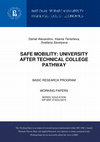
SSRN Electronic Journal, 2015
This paper presents the professional college system as a social mobility channel providing maximu... more This paper presents the professional college system as a social mobility channel providing maximum benefit with minimum risk. The analysis of institutional features and changes forming this channel in Russia in the last 15 years has been conducted. An institutional context for the emergence of a social group using "university after the college" pathway is described. Group members take an intermediate position between students reproducing a professional worker status and students reproducing a highly qualified professional status. They also have average school results. An analysis of parents' and students' perceptions of the motives of the choice, benefits, costs, and risks of the educational pathway demonstrates the importance of local context. An alternative educational pathway is less typical for the rural population because of structural constraints; compared to metropolises, in rural areas this choice is typical for higher status groups. A comparison of technical college systems in different countries confirmed that technical colleges in Germany provide social reproduction whereas in Russia and the USA, they operate as a channel of upward social mobility.
Zhurnal Sotsiologii i Sotsialnoy Antropologii (The Journal of Sociology and Social Anthropology)

Voprosy obrazovaniya / Educational Studies Moscow
Daniil Alexandrov - Candidate of Sciences in Biology, Head of the Laboratory of Sociology in Educ... more Daniil Alexandrov - Candidate of Sciences in Biology, Head of the Laboratory of Sociology in Education and Science, National Research University Higher School of Economics (Saint Petersburg). Address: 16 Soyuza Pechatnikov Str., 190121 St. Petersburg, Russian Federation. E-mail: dalexandrov@hse.ru Ksenia Tenisheva - Research Assistant, Sociology of Education and Science Laboratory, National Research University Higher School of Economics (St. Petersburg). Address: 55 Sedova Str., 190008, St. Petersburg, Russian Federation. E-mail: tenishewa. soc@gmail.com Svetlana Savelyeva - Deputy Head, Sociology of Education and Science Laboratory, National Research University Higher School of Economics (St. Petersburg). Address: 55 Sedova Str., 190008, St. Petersburg, Russian Federation. E-mail: ssavelieva@hse.ru The paper explores the relation between involvement of school students in extracurricular activities and their self-concept in mathematics and humanities as well as physical self-concept. The study is based on a survey involving over 5,000 ninth-graders from schools in St. Petersburg, Leningrad Oblast and Pskov. Descriptive statistics and regression analysis methods reveal that involvement in extracurricular activities of any kind is positively related with academic performance, most strongly with educational achievements in foreign languages. We found no gender differences in the relationship between extracurricular activities and academic performance or self-concept; even sports have the same effects on the self-concept of boys and girls. Both structured and unstructured extracurricular activities are positively related with academic achievement, though the relation for unstructured activities is weaker. Engagement in two or three types structured extracurricular activities and in unstructured activities at the same time appears to be the most useful option in terms of academic achievement. Extracurricular activities also boost students" self-concept in relevant academic domains. The strength of relationship between extracurricular activities and academic performance depends on the size of the city, being more conspicuous in small cities and towns than in megalopolises.
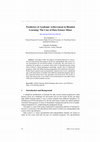
International Journal of Emerging Technologies in Learning (iJET)
This paper is dedicated to studying patterns of learning behavior in connection with educational ... more This paper is dedicated to studying patterns of learning behavior in connection with educational achievement in multi-year undergraduate Data Science minor specialization for non-STEM students. We focus on analyzing predictors of aca-demic achievement in blended learning taking into account factors related to initial mathematics knowledge, specific traits of educational programs, online and of-fline learning engagement, and connections with peers. Robust Linear Regression and non-parametric statistical tests reveal a significant gap in achievement of the students from different educational programs. Achievement is not related to the communication on Q&A forum, while peers do have effect on academic success: being better than nominated friends, as well as having friends among Teaching Assistants, boosts academic achievement.
Voprosy obrazovaniya / Educational Studies Moscow
Parental choice of primary school is analyzed using the example of local education systems in two... more Parental choice of primary school is analyzed using the example of local education systems in two districts of Saint Petersburg. The empirical basis of the research is provided by the results of a parent survey conducted in 34 schools (1,055 respondents). The following data is sorted and compared successively: whether parents make education
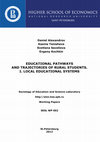
The paper presents first report on the study of rural schools and students in one educational dis... more The paper presents first report on the study of rural schools and students in one educational district of Leningrad region. The district comprises 12 small rural municipalities and 2 townships with 18 schools. The study employed both qualitative and quantitative methods and focuses on sorting between schools and educational choice after the 9 grade when students can either stay in their schools or transfer to vocational schools and technical colleges in the urban area of St. Petersburg. In the paper the educational choices and resulting trajectories are viewed in local social context. Researchers introduce a notion of “local educational system”, defined a set of local social (and geographical) opportunities and existing educational pathways which determine educational choice of parents and students. Higher education is a preferred goal after the school for the majority of students, but the trajectories to this goal are different depending on both family resources and local circumsta...
Voprosy Obrazovaniya/ Educational Studies. Moscow
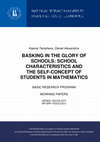
SSRN Electronic Journal, 2000
Our study contributes to the debate on the interaction between academic context, individual achie... more Our study contributes to the debate on the interaction between academic context, individual achievement, and mathematics self-concept in schools. It is known that high-achieving peers positively influence the individual achievements of all group members. At the same time, it has been shown that the self-concept of students tends to decrease in the presence of high-achieving peers, as individuals make relative judgments of their abilities vis-à-vis their peer group. Students with mediocre performance feel more confident about their abilities in a group of poor achievers (the Big-Fish-Little-Pond Effect-BFLPEintroduced by H.Marsh). On the other hand, perceived prestige of a school enhances the self-confidence of students as people tend to "bask in the glory" of others (the "reflected glory" effect). We test the two effects mentioned above-BFLPE and the "reflected glory" effect. We hypothesize that both effects are stronger in highly stratified education systems where there is a stronger explicit difference between highand poor-achieving students, and schools are ranked by their prestige. We compare the interaction of academic context, achievement, and mathematics self-concept in stratified (Russia and Czech Republic) and non-stratified (Norway and Sweden) educational systems on the TIMSS'07 database using HLM7. Our study shows: 1) an absence of BFLPE for all four countries, i.e. the achievement of others is positively related to an individual's math self-concept; 2) strong support for the "reflected glory" effect is found only in stratified educational systems; and 3) greater positive effect on self-concept for students with poor achievement who study in the best schools.









Uploads
Papers by Ksenia Tenisheva